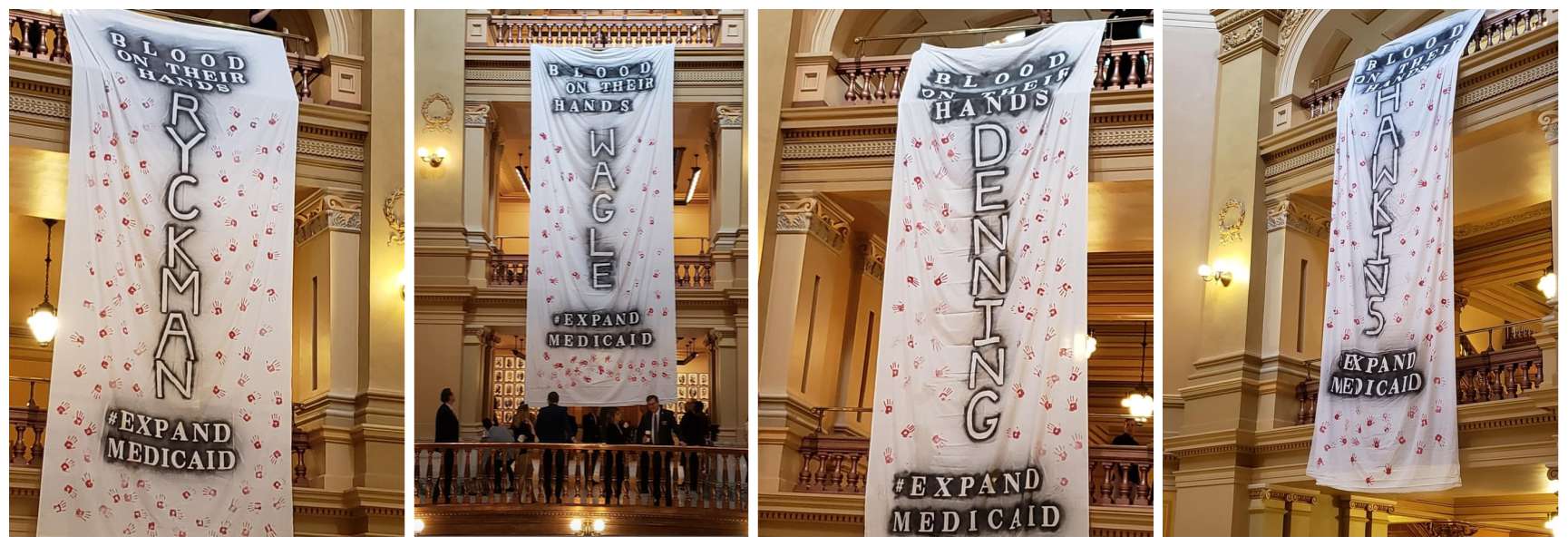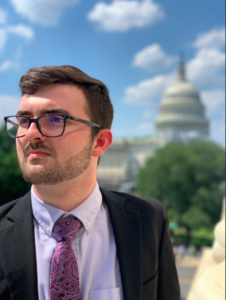
By NOAH TABORDA
Kansas Reflector
When Jonathan Cole unfurled a 24-foot banner in the rotunda of the Kansas Statehouse calling for the expansion of Medicaid, he didn’t expect to reshape Capitol policy on protests.
Cole, who now works in government technologies, sees how pertinent the demonstration was to current, ongoing protests over police reform.
“I’m glad we were able to bring more attention to the importance of expressing your First Amendment right to free speech at such an important time,” Cole said. “It is amazing to impact policy like this just because they wanted to kick us out of the Statehouse.”

In March of 2019, Cole and fellow Kansas State University students Katie Sullivan and Nathan Faflick, as well as Topeka Rev. Sarah Oglesby-Dunegan, unfurled four banners around the Capitol rotunda. The banners displayed the names of four GOP leaders who had “blood on their hands.”
All three students were removed from the premises and banned from the building by Capitol Police. Although the ban was rescinded shortly after, the handling of the situation led to a recently resolved lawsuit brought by the American Civil Liberties Union of Kansas over restrictions on expression in the Statehouse.
“We dropped those banners to advocate for those who may have had their voices oppressed,” said Sullivan, who now lives in Washington, D.C. “I’m so glad to see the barriers on my fellow Kansans doing the same have been reduced.”
Per the terms of the agreement announced last week, handheld signs are no longer banned and people no longer need a permit to hold a protest at the Statehouse, unless they are reserving a specific space. Protesters no longer are required to have a legislative sponsor. And Capitol Police can only ban individuals from the Statehouse for breaking a law, not rule violations. The students broke no laws during the March 2019 demonstration.
“The clients got basically everything they wanted,” said Lauren Bonds, legal director for the ACLU of Kansas. “We’re happy with the result of this case.”
Bonds said as soon as the ACLU filed its lawsuit, immediate action began to address certain issues.
“There was really an effort from the Department of Administration and the Capitol Police unit to walk back some of the policies at issue,” Bonds said. “The policy around banning individuals was revised. The prohibition on signs was revised.”

Capitol Police, a division of the Kansas Highway Patrol, directed questions on the case to the Attorney General’s office. John Milburn, spokesman for the A.G.’s office, said the office was “glad the lawsuit has concluded.”
Oglesby-Dunegan, who helped organize the banner protest and has been involved with several other high-profile demonstrations, said she has reflected on the case in the past year. She now lives in Georgia.
As she looks at protests across the nation and her case, Oglesby-Dunegan sees the importance of having a platform to voice complaints directly to representatives.
“Peaceful protests are what keeps our democracy and the conversation going,” Oglesby-Dunegan said. “When you take that away, that’s when people might escalate things to a place of violence, or a place that isn’t healthy for any of us.”
While the result of the case may be a step in the right direction, Cole, like Oglesby-Dunegan, isn’t content with what he sees going on outside his window.
“The Statehouse belongs to the people, so it’s good to be moving that way, but there is so much work left to be done in making sure any and all voices aren’t being politically suppressed,” Cole said.
. . .
Noah Taborda started his journalism career in public radio at KBIA in Columbia, Missouri, covering local government and producing an episode of the podcast Show Me The State while earning his bachelor’s degree in radio broadcasting at the University of Missouri School of Journalism. Noah then made a short move to Kansas City, Missouri, to work at KCUR as an intern on the talk show Central Standard and then in the newsroom, reporting on daily news and feature stories.





